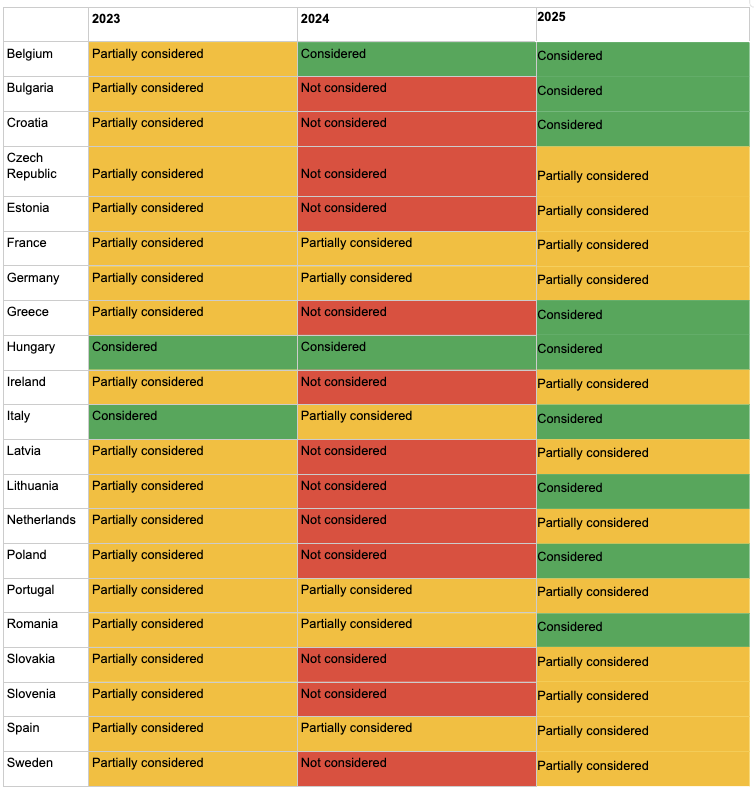European Semester 2025 Spring Package: The European Commission urges Member States to phase out fossil fuel subsidies
The European Commission recently issued 27 country reports and related specific recommendations addressed to each Member State, in the framework of the European Semester. We welcomes that CAN Europe’s recommendations were to a large extent taken on board by the European Commission in this 2025 Spring package by: (a) systematically including distinct sections tracking the evolution of fossil fuel subsidies in each Member State and (b) recommending the immediate phase-out of fossil fuels subsidies unless the latter are targeting vulnerable groups, for Member States in which fossil fuel subsidies represent a larger share of GDP. Overall, based on our updated tracker, the 2025 spring package incorporates the need to phase out fossil fuel subsidies considerably better than previous years.
Table 1: CAN Europe’s assessment of Semester reports and CSRs for a sample of 19 Members States


“We welcome that the European Commission took the necessary step to systematically include and assess fossil fuel subsidies in the European Semester process and we expect this approach to be maintaining and enhanced in the following years’ spring packages. Most notably, the Commission could enrich its assessment by incorporating implicit subsidies that measure the unpaid externalities associated with fossil fuels production and consumption, and urge the totality of Member States to set clear phase-out deadlines regardless of the size of the subsidies they provide. Crucially, we urge Member States to develop annual reporting mechanisms for fossil fuel subsidies through robust national inventories, set clear timelines, and begin phasing out fossil fuel subsidies within their upcoming national budgets”, said Olivier Vardakoulias, senior finance and subsidies policy coordinator at CAN Europe.
Beyond this positive development, “greening the semester” process to ensure an accelerated socially just green transition will require further reforms. The assessments of Member States’ progress against economic, social and environmental targets notably remain siloed within Semester reports, instead of being analysed in an integrated way: for example, although 2025 CSRs entail positive recommendations on the energy transition, nature, the circular economy, and social rights (housing, healthcare, inclusivity, sometimes the need to reduce inequality), they stand in contradiction with “fiscal consolidation” recommendations, including those asking several Member States to cut social spending such as increasing the retirement age or reducing the cost of healthcare. In short, the inherent contradiction remains between conflicting EU goals: reducing public spending (to meet arbitrary debt-to-GDP targets) and increasing military spending while improving education, healthcare and childcare and the need to mobilise additional investments for the green transition. This is an impossible equation that can only be solved by raising new fair taxes and putting people in the driving seat to decide the national spending priorities.
At CAN Europe we will continue proposing reforms to ensure a better alignment of fiscal and economic policy recommendations with EU climate, environmental and social objectives within the Semester process.
Background information
Despite several pledges of the EU and key Member States to phase-out “inefficient” fossil fuel subsidies by 2025, these commitments have remained an empty promise.
Not only fossil fuel subsidies have not been reduced since 2020, but according to the European Commission’s inventory, fossil fuel subsidies doubled between 2020 and 2022, reaching EUR 136 billion in the context of the energy crisis following the Russian invasion of Ukraine, before slightly decreasing to EUR 111 billion in 2023. Preliminary 2024 figures suggest a drop of total energy subsidies to EUR 78 billion, as most of the crisis subsidies are expected to expire by 2025 – however fossil fuel subsidies phase out commitments (by 2025) are unlikely to be met. Indeed, according to an assessment of National Energy and Climate Plans (NECPs) undertaken by the European Commission, so far only 6 of the 27 EU Member States have expressed their intention to fully phase out fossil fuel subsidies in their national budgets, albeit with no concrete end dates. Less than half of 2022 fossil fuel subsidies have a planned end date before 2025, 1% are planned to be phased out between 2025 and 2030, while 52% do not have an end.
As analysed in a recent opinion of the European Economic and Social Committee, there are several policy instruments that the EU has at its disposal to influence the phase-out of fossil fuel subsidies financed through national budgets in respective Member States – one of which is the European Semester process which, for all its flaws and limitations, is the main economic and fiscal coordination mechanism of the EU.
Within this context, previous CAN Europe reports (in 2024 & 2025) advocated for a systematic tracking of fossil fuel subsidies within Semester country reports, as well as distinct Country Specific Recommendations (CSRs) vis-à-vis their phase out in Member States’ budgets – on both climate and economic policy grounds. CAN Europe also developed an assessment grid to track the evolution of semester country reports and CSRs across time.



